the john muir exhibit - mountain_days - the storyline of mountain days: the john muir musical
-
john muir exhibit
Storyline of Mountain Days:
The John Muir Musical
With photos from the 2000 production at the Concord Pavilion
by Willows Theatre Company
It is night. A darkened room. An old man is
asleep at his desk, pen in hand. Behind him the silhouette of a woman
enters, straightens his papers and gently strokes his hair. He awakens
with a start as she fades away. The man is famous naturalist John Muir, in
his "scribble den" in his Martinez home, writing down for
posterity his thoughts and opinions formed over 73 years of wandering and
pondering nature and God's great universe. He pauses, and muses about
how he, "a tramp, a vagabond without worldly ambition" should
become so well known. How did it happen?
"As a lad in Scotland," he says,
"all I wanted was freedom - the kind which could only be found high
above the schools and kirks and squabble of the streets of Dunbar - so
every chance I got."
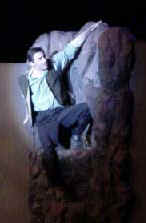
Immediately we are transported to Dunbar,
Scotland. It is a spring afternoon in 1849, and a boy is perched
precariously on the pitched roof of a cottage. It is John Muir,
valiantly, inching his way to the top. He sings:
I WANT TO TOUCH THE
SKY
CLIMB TO HEIGHTS WHERE I'VE NEVER BEEN
AND AVERAGE MEN WILL NEVER KNOW
His reverie is broken by the entrance of
his father, Daniel Muir, a devout minister and stern disciplinarian. He
shouts in his angry Scottish brogue.
"John Muir! Coom away doon from that
roof ye fightin', bitin', climbin' pagan! We're gan to America,
where a mon can worship as he pleases; where the streets are paved wi'
gold!"
Immediately throngs of immigrants appear,
belongings in hand, to the wharf of Glasgow. They sing about their new
life in America as the Muir family joins them and boards their ship:
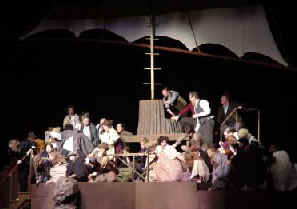
COME AWAY, COME AWAY
FROM THE WEARY LIFE YE KNOW
AWAY ACROSS THE OCEAN
TO AMERICA WE'LL GO
COME AWAY, COME AWAY,
LADDIE COME AWAY WITH ME
COME AND FIND YOUR FUTURE
NOT SO FAR ACROSS THE SEA!
Night falls and a fierce storm tosses the
ship. Young John emerges from behind a barrel and looks up at the mast. He
grabs hold of the mast and starts to climb, singing:
I WANT TO TOUCH THE SKY
WHERE THE FALCONS FLY
A WILDERNESS WHERE NO MAN DARES TO GO
The other immigrants come on deck and sing
of their ambition in counterpoint to John's hymn to the sky
I'LL BE RICH I'LL BE FREE
FIND SUCCESS CLIMB A TREE
OR A MOUNTAIN
I'LL BE A LEGEND IN
MY OWN TIME AS SURE AS MY NAME'S
FOR SURE! JOHN MUIR!
The ship lurches with another wave and John
loses his grip and falls as the scene shifts to Fountain Lake, the Muir
family farm in Wisconsin.
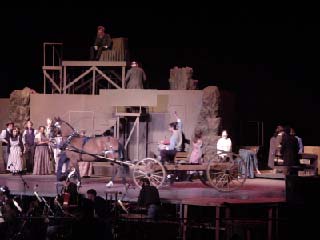
The five Muir children began their 17 hour
workday in the fields, joined by their neighbors, who sing THE WORK SONG.
John is lowered into a well to begin a day of digging as Daniel Muir
strikes off on horseback to preach. Duncan, a neighboring farmer, checks
on John's progress and gets no response to his hails. He immediately
pulls John, unconscious from choke gas, out of the well, and berates
Daniel for his parsimony, which almost killed his son. John sings that he
sees the face of God not in a church, like his father, but in flowers and
trees and plants, as his neighbors continue to toil and sing WORK, WORK
WORK.
When the song ends, John is a young man,
and in charge of the new family farm "Hickory Hill," and his father has
decided to devote all his time to preaching. John shows his younger
brother, Davey, a "labor-saving" device he has invented - his
"early-rising machine" - that will keep time, light the fire and
wake him dumping by him out of his bed in the morning. Davey loves it, and
John shows other inventions: hydrometers, pyrometers, a clock he has
mounted on the barn with fourteen foot hand so all the neighbors can see
the time from the road.
Soon we are at the Wisconsin State Fair of
1860, and John has won first prize for his inventions. He is invited by
Mr. And Mrs. Ezra and Jean Carr to live with them in exchange for odd
jobs. The Carrs open their extensive library to him and promise to see to
his formal education at the University of Wisconsin, where Professor Carr
is a faculty member. They see in him an extraordinary young man, and sing:
YOU'RE AN EXCEPTIONAL YOUNG MAN,
I HOPE YOU KNOW
WHO CAN TELL HOW FAR A BOY
LIKE YOU CAN GO
THE HEIGHTS WHICH YOU CAN CLIMB,
BUT EVEN SO
WHEN YOU'RE CAUGHT BETWEEN
YOUR FUTURE
AND A HUMBLE HERITAGE
SOMEBODY HAS TO BE THE BRIDGE.
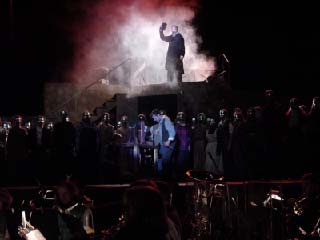
It is late at night, several years later,
and John is working in a factory in Indianapolis, surrounded by workers
toiling away at their laborious tasks (WORK SONG). Although he is warned
to be careful by a co-worker, his hands lose the grip on the file he is
working with, and it flies up and strikes his eye. John screams and is
plunged into darkness.
John makes a promise that if his sight is
restored, he'd never work on a machine again, but would devote his life
to the inventions of God. Gradually, he tells us, "the dark became
lighter, shadows became faces and the warmth on my face became the
sun."
John bids good-bye to his family and
embarks on his first great adventure, the THOUSAND MILE WALK. He travels
from Indiana to the Gulf of Mexico, meeting miners, farmers, Civil War
soldiers on their way home through a ruined south. At the end of his
journey he has determined the philosophy that will carry him through his
days, and he sings:
WE'RE ALL MADE OF THE SAME DUST
MAN, AND TREE AND MOUNTAIN
COVERED BY THE SAME SKY
AND POURED FROM THE SAME FOUNTAIN
WHERE 'ERE WE GO FROM CRADLE TO TOMB
WE ALL DWELL IN A HOUSE OF ONE GREAT ROOM
SAILING ON THE SAME CELESTIAL SEA
IN A CIRCLE OF ETERNAL UNITY.
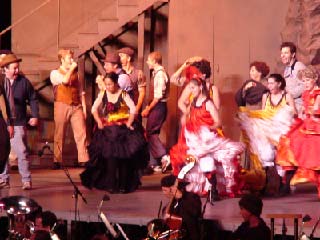
The scene shifts to the port of San
Francisco, circa 1868. John has just arrived via a tramp steamer, and is
immediately swept up in the hustle and bustle of the booming gold rush
town, as gamblers, barkers and Bowery Ladies sing of their favorite town -
SAN FRANCISCO.
John and his traveling companion, an
ambitious Cockney fellow by the name of Chilwell, escape the suffocating
madness of the city for the high Sierra, where there is rumor of something
greater than gold. They enter the Yosemite Valley, where John, for the
first time, beholds the magnificent splendor. He tells Chilwell, "I'm
home!" With the roar of Yosemite Falls thundering above them, they
sing the beautiful hymn:
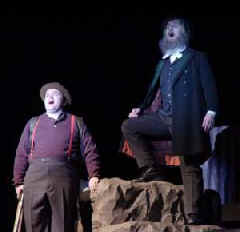
CLIMB THE MOUNTAINS
GET THEIR GLAD TIDINGS
LEAVE THE DARK
OF THE COLD CITY STREETS
FIND A MEADOW TO PLAY IN
A FOREST TO PRAY IN
LEAVE YOUR CIVILIZED STRIFE
FOR A FOUNTAIN OF LIFE!
It is now two years later, and John is
working as a wilderness guide for hotel owner James Hutchings. A bevy of
San Francisco society ladies arrive, having read a breast-beating romantic
account of the wilderness experience by Countess Yelverton. They all
request the dashing Mr. Muir for their guide (WHAT A LARK GETTING BACK TO
NATURE). John escapes in terror to his mountain perch home, which he calls
"the hanging nest."
Jean Carr has meanwhile moved to a home in
the Oakland Hills, and invites John to tea. After declining repeatedly, he
reluctantly appears, hat in hand, where he is immediately ushered out to
the balcony where a young lady, attempting to retrieve her dropped
spectacles, has found herself perched precariously on the edge of a
rock-like cliff. She calms herself by reciting John's writings about
Yosemite:
Looking at Yosemite falls from this
fissured point, towards noon in the spring, the rainbow on its brow
seems to be broken up and mingled with rushing comets until the fall
is stained with colors forming one of the most glorious sights
conceivable.
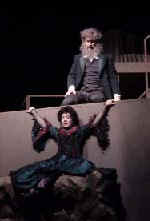
John overhears, coming to her rescue. They
sing of their close encounter (IT'S GOT TO BE THE ALTITUDE) and, as he
takes his leave, he asks her name. "Strentzel - Louie Strentzel,"
she replies.
We next find John in his "hanging
nest," suffering from writer's block, able to think of nothing but
the intriguing Miss Strentzel. When a Scottish artist, William Keith,
arrives, looking for a guide to show him some scenes of Yosemite that he
might paint, John decides that this is exactly what he needs to get Louie
off his mind. He climbs higher and higher, up mountains, rocky cliffs and
even mighty redwoods; the act ends as John discovers that no matter
where he goes:
I SEE HER SMILE
NOW SHE'S LAUGHING AS WELL
MY GOD! I'M IN LOVE
AND BY GOD, LOVE IS HELL
BUT THE WORLD'S SOMEHOW BRIGHTER
THE LONGER I FIND
THOUGH I'M DIRE DISINCLINED
OUT OF ALL HUMANKIND
THE WOMAN'S STILL ON MY MIND!
As Act 2 opens, we find ourselves at the
Strentzel ranch and adobe in Martinez, California. Louie and her father
are strolling through the orchard, discussing, among other things, the
mysterious Mr. Muir, when Dr. Strentzel spots a vagrant coming up the
drive.
"That's no vagrant," says
Louie, "That's the man I'm going to marry!"
John describes how he just happened to
arrive in Martinez after a 250 mile trip on a raft down the Merced and San
Joaquin rivers, and the two happily retreat to the house, hand in hand.
We immediately see the San Francisco ladies
who hounded John out of Yosemite, having tea and commenting cattily on the
rumors of a romance between John and Louie (LOVE'S IN BLOOM IN
MARTINEZ). The song follows their three year courtship - interrupted by
John's travels to Nevada and Alaska - and ends as the couple is
married.
The scene shifts to John, in his
"scribble den" in their large Victorian home in Martinez, as he
ruefully tells Keith about his lost freedom, now that he has a large farm
and 40 hands to manage and feed. And to make matters worse, Louie has
decided to throw a garden party.
High society gentlemen and ladies swirl on
the lawn to the lilting tune of the POLITICAL WALTZ, as a group of San
Francisco politicians, including Gifford Pinchot and Phalen, bemoan Muir's
formation of a new conservationist group - the Sierra Club:
MUIR IS A MAN OF GREAT INFLUENCE
THEY SAY
GROWING MORE ARROGANT
EVERY DAY
A CRUSADER! FANATICAL!
NOT TO EMPHASIZE HIS FAULTS
AS WE WALTZ AROUND,
SOUND PERFECTLY SINCERE
TELL THE VOTERS WHAT THEY WANT TO HEAR
MENTION "CONSERVATION,"
THEN TURN ABOUT
WHEN INDUSTRY CALLS, SELL IT OUT
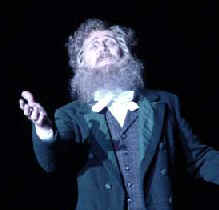 The waltz (and the party!) end when John
becomes enraged after overhearing the politician's discussing a plan to
dam the Hetch Hetchy valley in Yosemite National Park to provide water to
San Francisco, and throws them all out of the house.
The waltz (and the party!) end when John
becomes enraged after overhearing the politician's discussing a plan to
dam the Hetch Hetchy valley in Yosemite National Park to provide water to
San Francisco, and throws them all out of the house.
Louie, aware of the fact that running the
farm is destroying the man she loves, urges him to return to his beloved
Yosemite for awhile.
"You can't go explorin' and run a
ranch, Louie," he says.
"A ranch that needs and takes the
sacrifice of a noble life, or work, ought to be flung away," she
replies.
"I can't just... "
"You need to be true to your own self,
John."
"And you."
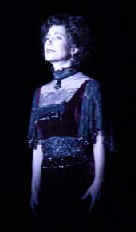
"And you! I know you love me, but
LOVE IS NOT A CAGE
LOVE IS NOT A CHAIN
LOVE IS NOT A LAW
OR AN ORDER TO REMAIN BY MY SIDE
WHENEVER WE'RE APART
YOU'RE STILL LYING NEXT TO ME
CLOSER THAN MY HEART
LOVE IS LIKE A RIVER
A RIVERS EBB AND FLOW
LOVE IS KNOWING WHEN TO LET YOU GO.
The scene shifts to the Mariposa Grove of
giant sequoias, where President Teddy Roosevelt has agreed to meet with
Muir to discuss the protection of the magnificent trees - which are
being dynamited by the hundreds to provide lumber for pastures fences.
Under the stars in the glorious setting, Roosevelt is so taken with Muir
he expresses his delight in song:
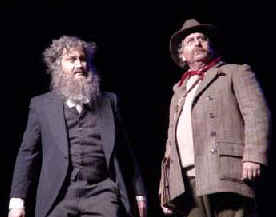
ITS TRULY BULLY BULLY WHEN ONE NIGHT
YOUR CAUSE IS INCONTESTABULLY RIGHT
YOUR REASON UNIMPEACHABULLY CLEAR
AND THE FOREST IRREPLACEABULLY DEAR
GIVE A CHEER
'CAUSE ITS BULLY BULLY BULLY
WHEN WE TWO ARE WONDERFULLY
UNITED TO PRESERVE THIS SACRED PLACE
BEFORE IT'S IRRETRIEVABULLY GONE
WITHOUT A TRACE!
It is the following year, 1904, and Louie
is passionately playing the piano while John once again becries the plan
to dam Hetch Hetchy. To get his mind off the problem, she sends him out to
play with their young daughters, Helen and Wanda, while she watches from
an upstairs window and sings of the joy of ORDINARY THINGS:
SUNLIGHT ON A CURTAIN
LAUGHTER ON THE STAIRS
A CANDLE IN A BEDROOM
MY CHILDREN AT THEIR PRAYERS
KNOWING THEY ARE SAFE AND SOUND
KNOWING HE IS NEAR
MY LIFE IS ORDINARY THINGS
AND ALL OF THEM ARE HERE.
John departs on a trip across Europe and
Asia, while Louie stays behind to mind the farm, but a telegram from a
doctor brings him back to Martinez, to find Louie gravely ill, suffering
from a tumor on her lung. While John recites the passage about the rainbow
in Yosemite she remembered from that balcony meeting so long ago, Louie
quietly dies. John reprises her song:
LOUIE DON'T GO
WE HAVEN'T FINISHED THE RAINBOW
YOU DIDN'T TELL ME
HOW FAST TOMORROW COULD FLY
LOVE IS LIKE A RAINBOW
FADING TO "GOOD-BYE"
LEAVING ME TO WATCH THE COLORS DIE.
It is several weeks later, and Helen
enters, entreating John to resume his writing, and reminding him of how
angry Louie would be if she knew she was the cause of his silence. Before
He can respond, the house shakes with an earthquake. John and the girls
run to the lawn, and ride out the quake, only to see a plume of angry
black smoke rise from the direction of San Francisco!
The lack of water to fight the fire, and
the destruction of San Francisco redoubles the effort to find a new water
supply. John takes on his final battle - a seven year effort to prevent
the damming of his beloved Hetch Hetchy valley - A VALLEY HAS A SOUL.
But, with Roosevelt out of the White House, and some shady
behind-the-scenes deal-making, the Raker Bill authorizing the dam passes.
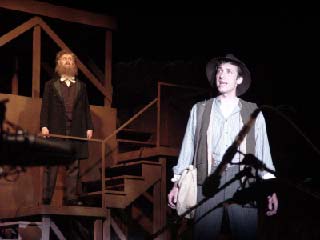
John, defeated and feeling like his life's
work has come to nothing, lies gravely ill in a hospital room in Los
Angeles. While the ghosts of his past - farmers in Wisconsin,
politicians, all Americans - waltz through his mind, Louie appears, and
reminds him that "words live forever. You may have lost a battle,
John, but you won a war."
She picks up the final paper he has been
working on, and sings the words:
CLIMB THE MOUNTAINS
GET THEIR GLAD TIDINGS
NATURE'S PEACE WILL FILL YOUR SOUL
WALK THE WOODS, SMELL THE AIR
AND SORROW AND CARE
OF LIVING WILL EASE
BLOWN AWAY WITH THE BREEZE.
As John joins her, a child dressed in 1920's
clothing takes up her song, then a family in 1940's clothes, and all the
decades to today, until the stage is filled with people of all ages and
nations and times singing John's words and carrying the message to the
future:
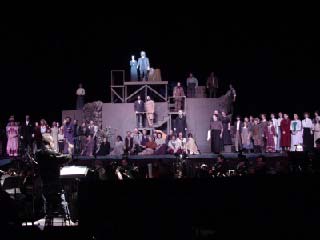
CLIMB THE MOUNTAINS
GET THEIR GLAD TIDINGS
LEARN TO WANDER
THE REST OF YOUR DAYS
FIND A MEADOW TO PLAY IN
A FOREST TO PRAY IN
LEAVE YOUR CIVILIZED STRIFE
FOR A FOUNTAIN OF LIFE.
Source: Willows Theatre. Text, lyrics, and photos reprinted by permission. All rights reserved.
Posted 10/28/00, updated 4/6/02.
More from Mountain Days:
See also
Home | Alphabetical Index | What's New